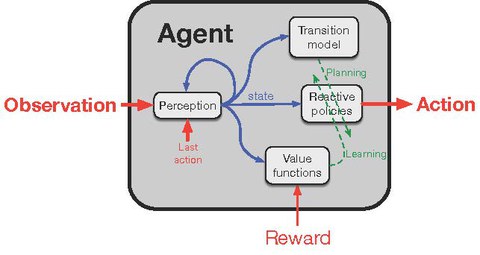Sep 21, 2022
Conference with keynote by Richard Sutton

Basismodell eines Agenten nach Sutton et al. (2022), CC BY-NC-ND 4.0 (https://creativecommons.org/licenses/by-nc-nd/4.0/)
Doctoral student Markus Leyser (BR3: Automated and Interpretable Modelling of the Energy Market Using Machine Learning Methods) attended the Conference on Reinforcement Learning 2022 Dresden (https://sites.google.com/view/rlconferencedresden/home) where computer scientist Richard Sutton presented on multidisciplinary research related to reinforcement learning, introducing The Reinforcement Learning Approach to Intelligence. The basic idea of reinforcement learning is that an agent in normal interaction with the environment learns to maximise a reward obtained through the interaction, taking into account the state the environment is in. The Canadian researcher is a professor of computer science at the University of Alberta and Distinguished Research Scientist at DeepMind Alberta. He is one of the founders of modern reinforcement learning and has made significant contributions, including to temporal difference learning and policy gradients methods. He is also known to many as the co-author of the standard work Reinforcement Learning: An Introduction.
In his talk, he discussed how to improve communication between researchers in the field of reinforcement learning and related and applied disciplines. These include robotics, psychology, other fields of machine learning, and economics. In his view, communication and cooperation between members of different disciplines is primarily hampered by discipline-specific model worlds. He calls for the development of a common basic model for an agent that connects the disciplines. He thus goes beyond the general demand to recognise differences in the respective disciplinary vocabulary.
Sutton places this demand in his research approach to artificial intelligence (AI), the so-called Alberta Plan, which aims to create a fundamental understanding of the AI subfield of computational intelligence. A preprint can be found at arXiv (https://arxiv.org/abs/2208.11173):
Sutton, R. S., Bowling, M. H., & Pilarski, P. M. (2022). The Alberta Plan for AI Research. arXiv preprint arXiv:2208.11173.
